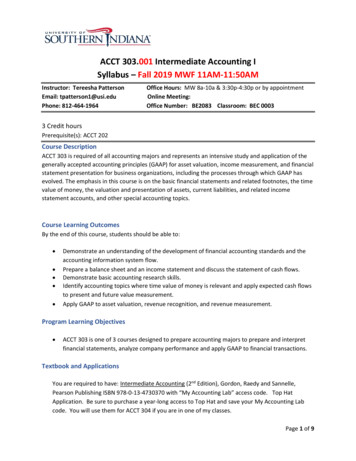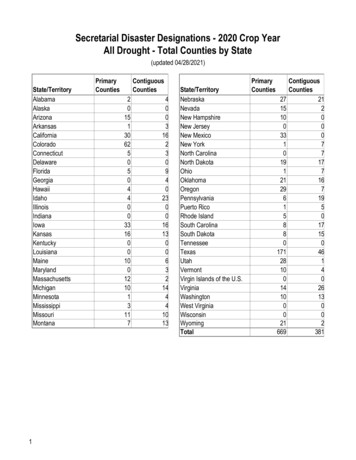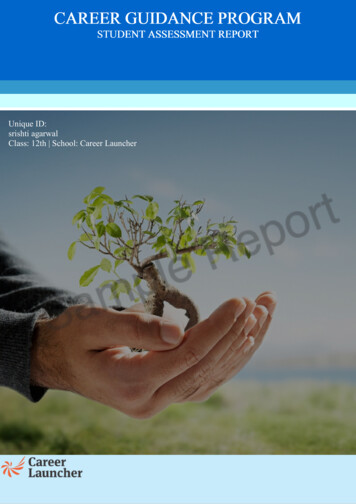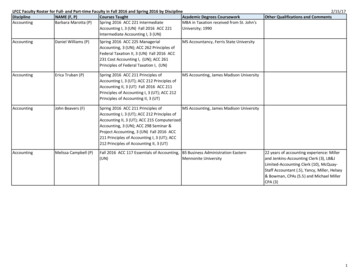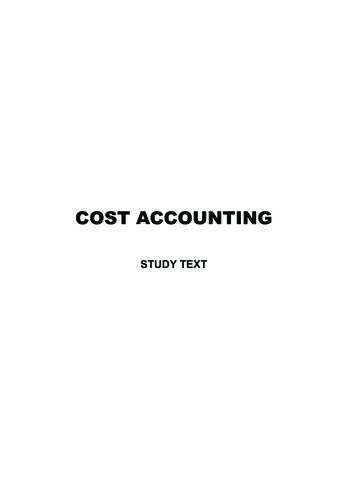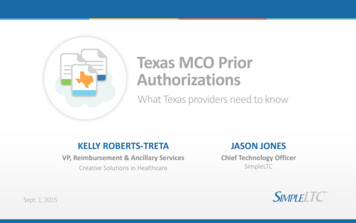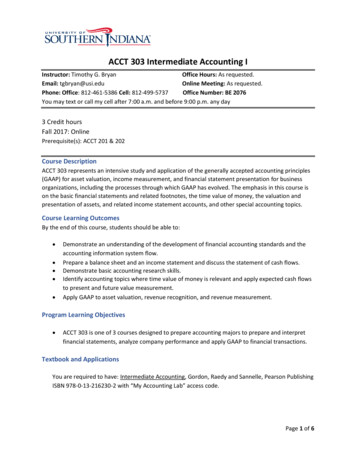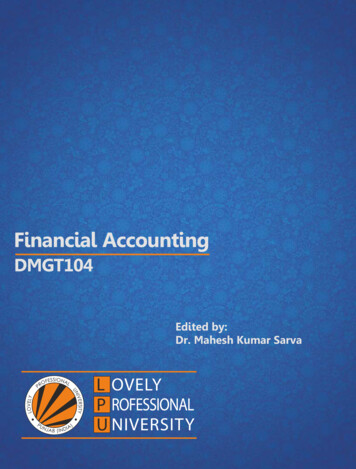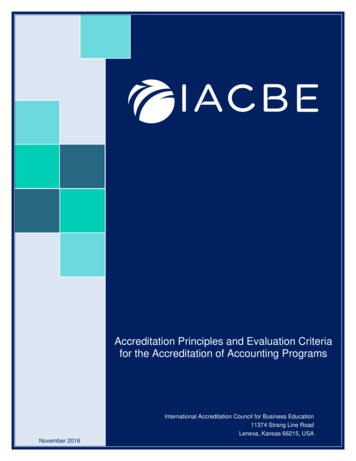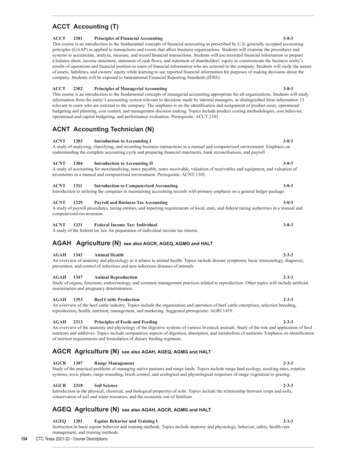
Transcription
ACCT Accounting (T)ACCT2301Principles of Financial Accounting3-0-3This course is an introduction to the fundamental concepts of financial accounting as prescribed by U.S. generally accepted accountingprinciples (GAAP) as applied to transactions and events that affect business organizations. Students will examine the procedures andsystems to accumulate, analyze, measure, and record financial transactions. Students will use recorded financial information to preparea balance sheet, income statement, statement of cash flows, and statement of shareholders’ equity to communicate the business entity’sresults of operations and financial position to users of financial information who are external to the company. Students will study the natureof assets, liabilities, and owners’ equity while learning to use reported financial information for purposes of making decisions about thecompany. Students will be exposed to International Financial Reporting Standards (IFRS).ACCT2302Principles of Managerial Accounting3-0-3This course is an introduction to the fundamental concepts of managerial accounting appropriate for all organizations. Students will studyinformation from the entity’s accounting system relevant to decisions made by internal managers, as distinguished from information 13relevant to users who are external to the company. The emphasis is on the identification and assignment of product costs, operationalbudgeting and planning, cost control, and management decision making. Topics include product costing methodologies, cost behavior,operational and capital budgeting, and performance evaluation. Prerequisite: ACCT 2301.ACNT Accounting Technician (N)ACNT1303Introduction to Accounting I3-0-3A study of analyzing, classifying, and recording business transactions in a manual and computerized environment. Emphasis onunderstanding the complete accounting cycle and preparing financial statements, bank reconciliations, and payroll.ACNT1304Introduction to Accounting II3-0-3A study of accounting for merchandising, notes payable, notes receivable, valuation of receivables and equipment, and valuation ofinventories in a manual and computerized environment. Prerequisite: ACNT-1303.ACNT1311Introduction to Computerized Accounting3-0-3Introduction to utilizing the computer in maintaining accounting records with primary emphasis on a general ledger package.ACNT1329Payroll and Business Tax Accounting3-0-3A study of payroll procedures, taxing entities, and reporting requirements of local, state, and federal taxing authorities in a manual andcomputerized environment.ACNT1331Federal Income Tax: IndividualA study of the federal tax law for preparation of individual income tax returns.AGAH Agriculture (N)3-0-3see also AGCR, AGEQ, AGMG and HALTAGAH1343Animal Health2-3-3An overview of anatomy and physiology as it relates to animal health. Topics include disease symptoms, basic immunology, diagnosis,prevention, and control of infectious and non-infectious diseases of animals.AGAH1347Animal Reproduction2-3-3Study of organs, functions, endocrinology, and common management practices related to reproduction. Other topics will include artificialinsemination and pregnancy determination.AGAH1353Beef Cattle Production2-3-3An overview of the beef cattle industry. Topics include the organization and operation of beef cattle enterprises, selection breeding,reproduction, health, nutrition, management, and marketing. Suggested prerequisite: AGRI 1419.AGAH2313Principles of Feeds and Feeding2-3-3An overview of the anatomy and physiology of the digestive systems of various livestock animals. Study of the role and application of feednutrients and additives. Topics include comparative aspects of digestion, absorption, and metabolism of nutrients. Emphasis on identificationof nutrient requirements and formulation of dietary feeding regimens.AGCR Agriculture (N)see also AGAH, AGEQ, AGMG and HALTAGCR1307Range Management2-3-3Study of the practical problems of managing native pastures and range lands. Topics include range land ecology, stocking rates, rotationsystems, toxic plants, range reseeding, brush control, and ecological and physiological responses of range vegetation to grazing.AGCR2318Soil Science2-3-3Introduction to the physical, chemical, and biological properties of soils. Topics include the relationship between crops and soils,conservation of soil and water resources, and the economic use of fertilizer.AGEQ Agriculture (N)154see also AGAH, AGCR, AGMG and HALTAGEQ1301Equine Behavior and Training I2-3-3Instruction in basic equine behavior and training methods. Topics include anatomy and physiology, behavior, safety, health caremanagement, and training methods.CTC Texas 2021-22 - Course Descriptions
AGEQ1311Equine Science IAn introduction to the horse industry. Topics include breeds and breeding, selection, and management practices.2-3-3AGEQ1319Western Horsemanship I2-3-3Instruction in basic horsemanship skills including handling, saddling, bridling, mounting, riding, grooming, safety, and basic health care.AGEQ2301Equine Behavior and Training II2-3-3A study of advanced concepts in equine behavioral patterns relevant to specific performance training strategies. Emphasis on trainingmethods for specific performance objectives.AGEQ2311Equine Science IIStudy of advanced concepts in horse production. Emphasis on management practices utilized in the horse industry.2-3-3AGEQ2339Western Horsemanship II2-3-3Instruction in advanced horsemanship skills including cues, lead changes, head-set, side-pass, and pivots. Prerequisite: AGEQ 1319.AGMG Agriculture (N)see also AGAH, AGCR, AGEQ, and HALTAGMG 2306Livestock and Meat Marketing2-3-3Exploration of the relationship of livestock production to marketing. Topics include trends, consumption, processing, distribution,governmental regulation, transportation, and animal health.AGMG 2486Internship Agriculture Business & Management, General0-19-4A work-based learning experience that enables the student to apply specialized occupational theory, skills and concepts. A learning plan isdeveloped by the college and the employer. Department approval required.AGRI Agriculture (T)AGRI1131The Agricultural Industry1-0-1Overview of agriculture and the American agricultural system, including an examination of career opportunities and requirements.AGRI1309Computers in AgricultureSurvey of the use of computers in agricultural applications.2-2-3AGRI1407Agronomy3-3-4Principles and practices in the development, production, and management of field crops including growth and development, climate, plantrequirements, pest management, and production methods. Laboratory activities will reinforce the fundamental principles and practicesin the development, production, and management of field crops including growth and development, climate, plant requirements, pestmanagement, and production methods.AGRI1415Horticulture3-3-4Structure, growth, and development of horticultural plants. Examination of environmental effects, basic principles of reproduction,production methods ranging from outdoor to controlled climates, nutrition, and pest management. Laboratory activities will reinforcethe structure, growth, and development of horticultural plants. Examination of environmental effects, basic principles of reproduction,production methods ranging from outdoor to controlled climates, nutrition, and pest management.AGRI1419Introductory Animal Science3-3-4Scientific animal production and the importance of livestock and meat industries. Selection, reproduction, nutrition, management, andmarketing of livestock. Laboratory activities will reinforce scientific animal production and the importance of livestock and meat industries.Selection, reproduction, nutrition, management, and marketing of livestock.AGRI2301Agriculture Power Units2-2-3Fundamentals of internal combustion engines: gasoline, diesel, and liquefied petroleum. Maintenance and adjustments of the electrical,ignition, fuel, lubricating, and cooling systems of agricultural power machinery.AGRI2317Introduction to Agriculture EconomicsFundamental economic principles and their application in the agriculture industry.3-0-3AGRI2330Wildlife Conservation and Management2-2-3Principles and practices used in the production and improvement of wildlife resources. Aesthetic, ecological, and recreational uses of publicand private lands.AIRP Aviation Science (N)see also AVIMAIRP1255Intermediate Flight1-3-2Provides students with flight hours and skills to fulfill solo cross country requirements for the F.A.A., Commercial Pilot Certificate withairplane single engine land rating. Dual flight instruction provided to introduce basic instrument operations including instrument approachesand holding procedures. Prerequisites: AIRP 2250, F.A.A. Private Pilot Certificate with Airplane Category Rating; Current Class II F.A.A.Medical Certificate and completion or concurrent enrollment in AIRP 1341.AIRP1305Aircraft Science3-0-3Introductory course in the development of aviation. Topics include design and development of aircraft and aircraft components, basic flightsystems, aircraft flight characteristics and performance and the historical development of the Aviation Industry.CTC Texas 2021-22 - Course Descriptions155
AIRP1307Aviation Meteorology3-0-3In-depth study of meteorological phenomena affecting aircraft operations. Topics include basic concepts of aviation meteorology includingtemperature, moisture, pressure and stability. Major emphasis is placed on recognition and avoidance of common aviation weather hazards.Course also covers procurement, analysis and use of weather reports and forecasts for flight planning.AIRP1315Private Flight2-3-3Flight training to prepare the student for the completion of F.A.A. certification requirements for the Private Pilot Certificate with AirplaneSingle Engine Land Rating. Dual and solo flight hours are included for training in the areas of private pilot flight maneuvers and crosscountry navigation. Prerequisite: F.A.A. Class II Medical Certificate, F.A.A. Student Pilot Certificate and completion or concurrentenrollment in AIRP 1417.AIRP1341Advanced Air Navigation3-0-3Skill development in advanced airplane systems and performance including radio navigation and cross-country flight planning. Includesan introduction to instrument flight operations and navigation. This course may be used as part of a program leading to Federal AviationAdministration certification. Prerequisite: AIRP 1451.AIRP1343Aerodynamics3-0-3Study of the general principles of the physical laws of flight. Topics include physical terms and the four forces of flight: lift, weight, thrust,and drag; aircraft design; stability control; and high-speed flight characteristics.AIRP1417Private Pilot Ground School3-3-4Basic ground school for the Private Pilot Certificate, providing the student with the necessary aeronautical knowledge that can be usedfor FAA Private Pilot Certification. Topics include principles of flight, radio procedures, weather, navigation, aerodynamics, and FederalAviation Administration regulations.AIRP1451Instrument Ground School3-3-4A study of basic instrument radio and navigation fundamentals used in instrument flight. Topics include a description and practical use ofaerial navigation systems and instruments, charts used for instrument flight, and Federal Aviation Administration regulations. Qualifies aspart of a program leading to Federal Aviation Administration certification. Prerequisite: AIRP 1417.AIRP2239Commercial Flight1-3-2Flight instruction necessary to qualify for the Federal Aviation Administration Commercial Pilot Certificate. Instruction includes bothdual and solo flight training to prepare the student for mastery of all commercial pilot maneuvers. Prerequisite: Minimum of a PrivatePilot Certificate with Airplane category and instrument rating; have at least 125 hours of flight time of which no more than 40 were inan approved ground trainer; hold a current Class II FAA Medical Certificate; have completed or be concurrently enrolled in AIRP 2337,Commercial Ground School. Approved ground school must be completed prior to finishing AIRP 2239.AIRP2243Flight Instructor -Multiengine Airplane1-2-2Instruction in flight training to prepare the student for the Federal Aviation Administration Flight Instructor - Multiengine Airplane Rating.Includes combined ground and flight instruction and analysis of flight maneuvers. Prerequisite: Must hold a current FAA CFI Certificatewith Airplane Single Engine Rating and Instrument Airplane.AIRP2250Instrument Flight1-3-2Preparation for completion of the Federal Aviation Administration Instrument Pilot Rating with mastery of all instrument procedures.Prerequisite: Minimum of a Private Pilot Certificate with an Airplane category; hold a Class II FAA Medical Certificate; a minimum of95 hours of flight experience of which 25 were solo cross-country since the Private Pilot Certificate was issued; 20 hours of instrumentinstruction of which no more than 10 were in an approved ground trainer; have completed or will complete AIRP 1451 before the end of thiscourse.AIRP2251Multiengine Flight2-2-2Preparation for the multiengine class rating which will be added to a current pilot certificate. Includes explanation and demonstration of allrequired Federal Aviation Administration normal and emergency operations and procedures. Prerequisite: Commercial Pilot Certificate.AIRP2336Certified Flight Instructor - Airplane2-3-3Flight instruction necessary to qualify for the Federal Aviation Administration Certified Flight Instructor - Airplane Certificate. Topicsinclude ground and flight instruction. Prerequisite: Must hold Commercial Pilot certification with instrument rating.AIRP2337Commercial Ground School3-0-3A study of advanced aviation topics that can be used for Federal Aviation Administration certification at the commercial pilot level. Includespreparation for the Commercial Airplane knowledge test. Prerequisite: AIRP 1451.AIRP2342Flight Instructor - Instrument Airplane2-2-3Skill development for flight instructors necessary to qualify for the Federal Aviation Administration Certified Flight Instructor InstrumentRating, Airplane Single-Engine Land. Prerequisite: Certified Flight Instructor Certificate, with Single Engine Rating.AIRP2355Propulsion Systems3-0-3In-depth coverage of aircraft engine theory and principles of operation of various types of aircraft engines including reciprocating,turboprop, turbojet, and turbo fan. Topics include propellers, superchargers, engine accessories, controls, and instrumentation.ANTH Anthropology (T)156ANTH2301Physical Anthropology3-0-3The study of human origins and bio-cultural adaptations. Topics may include primatology, genetics, human variation, forensics, health, andethics in the discipline.CTC Texas 2021-22 - Course Descriptions
ANTH2302Introduction to Archeology3-0-3The study of the human past through material remains. The course includes a discussion of methods and theories relevant to archeologicalinquiry. Topics may include the adoption of agriculture, response to environmental change, the emergence of complex societies, and ethicsin the discipline.ANTH2346General Anthropology3-0-3The study of human beings, their antecedents, related primates, and their cultural behavior and institutions. Introduces the major subfields:physical and cultural anthropology, archeology, linguistics, their applications, and ethics in the discipline.ANTH2351Cultural Anthropology3-0-3The study of human cultures. Topics may include social organization, institutions, diversity, interactions between human groups, and ethicsin the discipline.ARCE Computer Aided Drafting and Design (N)see also DFTGARCE1452Structural Drafting3-3-4A study of structural systems including concrete foundations and frames, wood framing and trusses, and structural steel framing systems.Includes detailing of concrete, wood, and steel to meet industry standards including the American Institute of Steel Construction and TheAmerican Concrete Institute. Prerequisite: DFTG 1409.ARTC Graphics and Printing (N)see also GRPHARTC1302Digital Imaging I2-4-3Digital imaging using raster image editing and/or image creation software; scanning, resolution, file formats, output devices, color systems,and image-acquisitions.ARTC1313Digital Publishing I2-4-3The fundamentals of using digital layout as a primary publishing tool and the basic concepts and terminology associated with typographyand page layout.ARTC1327Typography2-4-3A study of letterforms and typographic concepts as elements of graphic communication. Emphasis on developing a current, practicaltypographic knowledge based on industry standards. Prerequisite: ARTC 2348.ARTC2305Digital Imaging II2-4-3Principles of digital image processing and electronic painting. Emphasis on bitmapped- or raster-based image marking and the creativeaspects of electronic illustration for commercial or fine art applications. Prerequisite: ARTC 1302.ARTC2313Digital Publishing II2-4-3Layout procedures from thumbnails and roughs to final comprehensive and print output. Emphasis on design principles for the creation ofadvertising and publishing materials, and techniques for efficient planning and documenting projects. Prerequisite: ARTC 1313.ARTC2333Publication Design2-4-3Development of skills and advanced knowledge of publishing software, with emphasis on the maintenance of visual continuity indocuments for publication. Prerequisite: ARTC 2348.ARTC2348Digital Publishing III2-4-3A project based page layout course from concept to completion addressing design problems, preflight of files, color separations, andtrapping techniques. Prerequisite: ARTC 2313.ARTC2435Portfolio Development for Graphic Design3-3-4Preparation of a portfolio comprised of completed graphic design projects. An evaluation and demonstration of the portfolio presentationmethods based on the student’s specific area of study.ARTC2488Internship – Commercial and Advertising Art0-19-4A work-based learning experience that enables the student to apply specialized occupational theory, skills and concepts. A learning plan isdeveloped by the college and the employer. Prerequisite: Department approval required.ARTS Arts (T)ARTS1303Art History I3-0-3A chronological analysis of the historical and cultural contexts of the visual arts from prehistoric times to the 14th century. Prerequisite:NoneARTS1304Art History II3-0-3A chronological analysis of the historical and cultural contexts of the visual arts from the 14th century to the present day. Prerequisite:NoneARTS1311Design I (2-dimensional)2-4-3An introduction to the fundamental terminology, concepts, theory, and application of two-dimensional design. Prerequisite: NoneCTC Texas 2021-22 - Course Descriptions157
ARTS1312Design II (3-dimensional)2-4-3An introduction to the fundamental terminology, concepts, theory, and application of three-dimensional design. Prerequisite: NoneARTS1316Drawing I2-4-3A foundation studio course exploring drawing with emphasis on descriptive, expressive and conceptual approaches. Students will learn tosee and interpret a variety of subjects while using diverse materials and techniques. Course work will facilitate a dialogue in which studentswill engage in critical analysis and begin to develop their understanding of drawing as a discipline. Prerequisite: NoneARTS1317Drawing II2-4-3A studio course exploring drawing with continued emphasis on descriptive, expressive and conceptual approaches. Students will furtherdevelop the ability to see and interpret a variety of subjects while using diverse materials and techniques. Course work will facilitate adialogue in which students will employ critical analysis to broaden their understanding of drawing as a discipline. Prerequisite: ARTS 1316.ARTS2311Design III (Color Theory)2-4-3Studio art course that is a theoretical and practical study of color and composition in art and design. The course consists of studio basedprojects using the formal and conceptual aspects of color. The course also examines the function s of color in art from different historicaland cultural perspectives.Prerequisite: Computer literacy and ARTS 1311, or Instructor Approval.ARTS2313Graphic Design2-4-3Studio course that introduces basic objectives, principles and methods used in graphic design. The course focuses on creativity, aestheticjudgment and critical thinking skills to expand conceptual solutions within the realm of contemporary graphic design. Prerequisite: NoneARTS2316Painting IStudio art course that introduces the fundamental principles, materials, and techniques of painting.Prerequisite: None.2-4-3ARTS2317Painting IIStudio art course that furthers the study of the principles, materials and techniques of painting. Prerequisite: ARTS 2316.2-4-3ARTS2323Life Drawing I2-4-3Studio art course that introduces the analytic study of the human form and the figure’s potential for compositional and expressive use indrawing. Prerequisite: None.ARTS2341Metals2-4-3An introduction to jewelry-making and metalworking techniques. Basic fabrication techniques are stressed including bezel settings. Somelost wax casting is included. Prerequisite: NoneARTS2346Ceramics I2-4-3A studio art course that introduces basic building, throwing, and other techniques as it relates to the design and production of ceramicsculpture and pottery. Prerequisite: NoneARTS2347Ceramics II2-4-3A studio art course that furthers the study of building, throwing, and other techniques as it relates to the design and production of ceramicsculpture and pottery. Prerequisite: ARTS 2346.ARTS2348Digital Media2-4-3Studio art courses that explore the potential of the computer hardware and software medium for their visual, conceptual, and practical usesin the visual arts.ARTS2356Photography I (fine arts emphasis)2-4-3A studio art course that introduces the technical and conceptual basics of photography as a creative medium. Prerequisites: None.ARTS2357Photography II (fine arts emphasis)2-4-3A studio art course that furthers the study of the technical and conceptual basics of photography as a creative medium. Prerequisite: ARTS2356.ARTS2366Watercolor I2-4-3Studio art course that introduces the fundamental principles, materials, and techniques of watercolor and other water-based media.Prerequisite: None.ARTS2389Academic Cooperative2-4-3An instructional program designed to integrate on-campus study with practical hands-on work experience. In conjunction with classseminars, the individual student will set specific goals and objectives in the study of studio art and/or art history.AUMT Automotive Service and Repair (N)AUMT 1319Automotive Engine Repair2-4-3Fundamentals of engine operation, diagnosis and repair. Emphasis on identification, inspection, measurements, and disassembly, repair, andreassembly of the engine. Prerequisites: AUMT 2305.AUMT 1405Introduction to Automotive Technology3-3-4An introduction to the automotive industry including automotive history, safety practices, shop equipment and tools, vehicle subsystems,service publications, professional responsibilities, and basic automotive maintenance.158CTC Texas 2021-22 - Course Descriptions
AUMT 1407Automotive Electrical Systems2-7-4An overview of automotive electrical systems including topics in operational theory, testing, diagnosis, and repair of charging and startingsystems, and electrical accessories. Emphasis on electrical principle schematic diagrams and service manuals. Prerequisites: AUMT 1405.AUMT 1410Automotive Brake Systems2-6-4Operation and repair of drum/disc type brake systems. Topics include brake theory, diagnosis, and repair of power, manual, anti-lock brakesystems, and parking brakes. Prerequisite: AUMT 1405.AUMT 1416Automotive Suspension and Steering Systems2-6-4Diagnosis and repair of automotive suspension and steering systems including electronically controlled systems. Includes component repair,alignment procedures and tire and wheel service. Prerequisite: AUMT 1405.AUMT 1445Automotive Climate Control Systems2-6-4Diagnosis and repair of manual/electronic climate control systems; includes the refrigeration cycle and EPA guidelines for refrigeranthandling. Prerequisites: AUMT 1407.AUMT 2305Automotive Engine Theory2-2-3Fundamentals of engine operation and diagnosis including lubrication and cooling systems. Emphasis on identification of components,measurements, inspections, and repair methods. Prerequisite: AUMT 1405.AUMT 2337Automotive Electronics2-4-3Study of electronic principles applied to microcomputers and communication systems. Includes digital fundamentals, and use of electronictest equipment. Prerequisites: AUMT 1407.AUMT 2413Automotive Drive Train and Axles2-6-4A study of automotive clutches, clutch operation devices, manual transmissions/transaxles, and differentials with emphasis on the diagnosisand repair. Prerequisite: AUMT 1405.AUMT2417Automotive Engine Performance Analysis I2-7-4Theory, operation, diagnosis of drivability concerns, and repair ignition and fuel delivery systems. Use of current engine performancediagnostic equipment. Prerequisites: AUMT 2337.AUMT 2425Automotive Automatic Transmission and Transaxle2-6-4A study of the operation, hydraulic circuits and electronic controls of modern automatic transmissions/transaxles. Diagnosis, disassembly,and assembly procedures with emphasis on the use of special tools and repair techniques. Prerequisite: AUMT 2413.AUMT 2434Automotive Engine Performance Analysis II2-7-4Diagnosis and repair of emission systems, computerized engine performance systems, and advanced ignition and fuel systems. Includes useof advanced engine performance diagnostic equipment. Prerequisites: AUMT 2417.AUMT 2488Internship - Automobile/Automotive Mechanics Technology/Technician0-19-4A work-based learning experience that enables the student to apply specialized occupational theory, skills and concepts. A learning plan isdeveloped by the college and employer. Prerequisite: Department approval required.AVIM Aviation Science (N)see also AIRPAVIM2331Airline Management3-0-3An examination of the organization, operation, and management of airlines. Topics include financing, aircraft selection, route feasibilitystudies, load factors, and marketing.BCIS Computer Information Technology and Systems (T)ITCC, ITNW, ITSC, ITSE, ITSW, ITSYsee also CETT, COSC, CPMT, IMED,BCIS1305Business Computer Applications2-4-3Introduces and develops foundational skills in applying essential and emerging business productivity information technology tools. Thefocus of this course is on business productivity software applications, including word processing, spreadsheets, databases, presentationgraphics, data analytics, and business-oriented utilization of the internet. (BCIS 1305 is included in the Business Field of Study.)Prerequisites: NoneBIOL Biology (T)BIOL1322Nutrition and Diet Therapy I3-0-3This course introduces general nutritional concepts in health and disease and includes practical applications of that knowledge. Specialemphasis is given to nutrients and nutritional processes including functions, food sources, digestion, absorption, and metabolism. Foodsafety, availability, and nutritional information including food labels, advertising, and nationally established guidelines are addressed. Thiscourse does not fulfill the Science requirement necessary for the completion of the Core Curriculum, the Associate of Science degree andthe Associate of Arts degree.BIOL1406Biology for Science Majors I3-3-4Fundamental principles of living organisms will be studied, including physical and chemical properties of life, organization, function,evolutionary adaptation, and classification. Concepts of cytology, reproduction, genetics, and scientific reasoning are included. Courseincludes laboratory activities. Prerequisite: Appropriate placement score or TSI exemption or completion of the appropriate level ofCTC Texas 2021-22 - Course Descriptions159
Developmental Studies course. Co-requisite BIOX 1406. Recommended prerequisite: Successful completion of College Algebra orconcurrent enrollment in higher-level mathematics is recommended. TSI Skills: R, M.BIOL1407Biology for Science Majors II3-3-4The diversity and classification of life will be studied, including animals, plants, protists, fungi, and prokaryotes. Special emphasis will begiven to anatomy, physiology, ecology, and evolution of plants and animals. Course includes laboratory activities. Prerequisite: Appropriateplacement score or completion of the appropriate level of Developmental Studies course. Co-requisite: BIOX 1407. Recommendedprerequisite: Successful completion of College Algebra or concurrent enrollment in higher-level mathematics is recommended. Note: It isrecommended that BIOL 1406 be taken before BIOL 1407. TSI Skills: R, M.BIOL1408Biology for Non-Science Majors I3-3-4This lecture and lab course provides a survey of biological principles with an emphasis on humans, including chemistry of life, cells,structure, function, and reproduction. Co-requisite: BIOX 1408.BIOL1409Biology for Non-Science Majors II3-3-4This course will provide a survey of biological principles with an emphasis on humans, including evolution, ecology, plant and animaldiversity, and physiology. Course objectives will be met in lecture and laboratory. Pre-requisite: none. Co-requisite: BIOX 1409.BIOL1411General Botany3-3-4Fundamental biological concepts relevant to plant physiology, life cycle, growth and development, structure and function, and cellularand molecular metabolism. The role of plants in the environment, evolution, and phylogeny of major plant groups, algae, and fungi.(This course is intended for science majors.) Laboratory activities will reinforce fundamental biological concepts relevant to the coursematerial. Recommended prerequisite: Successful completion of College Algebra or concurrent enrollment in higher-level mathematics isrecommende
ACCT Accounting (T) ACCT 2301 Principles of Financial Accounting 3-0-3 This course is an introduction to the fundamental concepts of financial accounting as prescribed by U.S. generally accepted accounting principles (GAAP) as applied to transactions and events that affect business organizations. Students will examine the procedures and
